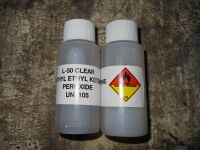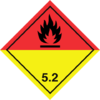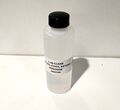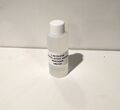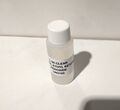Difference between revisions of "Methyl Ethyl Ketone Peroxide"
| (28 intermediate revisions by the same user not shown) | |||
| Line 1: | Line 1: | ||
| − | [[Methyl Ethyl Ketone Peroxide]] (MEKP) is a hardener | + | [[Methyl Ethyl Ketone Peroxide]] (MEKP) is a hardener for [[Polyester Resin]]s and [[Gelcoat]]s. 9% active oxygen. It is used in small quantities relative to the resin when mixing. |
| − | + | ||
| + | Note: Over 8 oz. cannot be shipped UPS | ||
| + | |||
| + | Always do a trial run if you are unsure what amount of catalyst to use. | ||
| + | |||
==Safety== | ==Safety== | ||
| − | MEKP is | + | [[File:MEKP Small Bottle.jpg|200px|thumb|right|]] |
| + | MEKP is flammable. It is also corrosive. Avoid contact with skin. It will cause a light chemical burn (wash with water and soap, if that happens. Absolutely avoid eye contact.). Goggles should be worn when mixing. The MEKP we sell is diluted, but still hazardous. Keep away from children. | ||
===Splashing=== | ===Splashing=== | ||
| − | Any MEKP splashing on the skin should be | + | What tends to happen to me, is that a syringe will splash when mixing small amounts of MEKP with resin. Any MEKP splashing on the skin should be rinsed off with water and soap. It will give you a light chemical burn (you might notice it after a moment), and that will go away after cleaning. Try to predict and avoid situations where it will splash around. And absolutely avoid getting it in your eyes. Pure MEKP is reportedly more dangerous than the diluted one we sell. Ultimately, I find it's not so hazardous to the user, when I have goggles, but it can make a mess where you are working. |
| + | ==Fire Hazard== | ||
| + | {{Template:OrganicPeroxideLabel}} | ||
==Mixing Table== | ==Mixing Table== | ||
{{MixingTable}} | {{MixingTable}} | ||
| − | == | + | ==Tips/Tricks== |
| + | ===Catalyst Measuring Syringes or Beakers=== | ||
| + | You may want to consider using [[Catalyst_Measuring_Syringes]] or beakers when dispensing MEKP. For a gallon, I tend to use a 100ml beaker. For a quart, I would use a 10 or 20ml syringe. | ||
| + | |||
| + | ===Cleanup=== | ||
| + | Of all the chemicals we use, the most unpleasant to cleanup is MEKP, so try to avoid spilling it. You can spill resin, or acetone and it will clean relatively easy, but MEKP is more corrosive to the environment. So please take extra care with MEKP. I use plastic totes to hold MEKP containers and beakers when working. | ||
| + | |||
| + | ===The amount of catalyst used can vary depending on the 'thickness' of the Polyester resin mass=== | ||
| + | As an example, if you have 1/2 quart of resin in a 1 quart can, and you use 2ml of MEKP from a syringe, the resin will cure to a solid mass, although it may take overnight. This is a very small amount of MEKP. Because the resin is in a large mass, (i.e. you are curing the resin in the can itself) you are able to use a smaller amount of catalyst. On the other hand, if you try to brush or spray the same amount of resin & hardener to a thin film coating, it will not properly cure. In order to cure that same 1/2 quart of resin brushed to a thin coat, you must use 5ml of MEKP. | ||
| + | |||
| + | To put it simply, if you are curing a thick mass of Polyester resin, you are able to use less MEKP. Thin films will require more. In general, 1% is a recommended amount of MEKP. But, this nuance of resin is important to understand. You can use smaller amounts of MEKP in thicker masses of resin to get an equivalent cure. Be careful not to confuse this with the epoxy we sell where thick masses of epoxy resin are not possible to be cured (it will exothermically react, i.e. generate steam and overheat). | ||
| + | |||
| + | ===Make sure to tighten the cap sufficiently=== | ||
| + | I have seen an MEKP bottle leak, if the cap is not 'fully tightened'. This is just something to be cautious of. By examining the inside of the cap, you will see it makes a plastic seal around the bottle. If the cap is slightly loose - you may get a leak - should the bottle be tipped on its side. | ||
| + | |||
| + | ==Images== | ||
| + | <gallery> | ||
| + | File:Catalyst 1.jpg|200px|thumb|| | ||
| + | File:Catalyst 2.jpg|200px|thumb|| | ||
| + | File:Catalyst 3.jpg|200px|thumb|| | ||
| + | </gallery> | ||
==See Also== | ==See Also== | ||
[[Hand Lay Up Guide]] - Detailed instructions for Polyester Resin application. | [[Hand Lay Up Guide]] - Detailed instructions for Polyester Resin application. | ||
| + | [[Category:Products]] | ||
| + | [[Category:ResinAdditives]] | ||
Latest revision as of 02:36, 18 September 2025
Methyl Ethyl Ketone Peroxide (MEKP) is a hardener for Polyester Resins and Gelcoats. 9% active oxygen. It is used in small quantities relative to the resin when mixing.
Note: Over 8 oz. cannot be shipped UPS
Always do a trial run if you are unsure what amount of catalyst to use.
Safety
MEKP is flammable. It is also corrosive. Avoid contact with skin. It will cause a light chemical burn (wash with water and soap, if that happens. Absolutely avoid eye contact.). Goggles should be worn when mixing. The MEKP we sell is diluted, but still hazardous. Keep away from children.
Splashing
What tends to happen to me, is that a syringe will splash when mixing small amounts of MEKP with resin. Any MEKP splashing on the skin should be rinsed off with water and soap. It will give you a light chemical burn (you might notice it after a moment), and that will go away after cleaning. Try to predict and avoid situations where it will splash around. And absolutely avoid getting it in your eyes. Pure MEKP is reportedly more dangerous than the diluted one we sell. Ultimately, I find it's not so hazardous to the user, when I have goggles, but it can make a mess where you are working.
Fire Hazard
Warning: This product is Flammable, and an Organic Peroxide.
Mixing Table
Small amounts of catalyst are required for Polyester Resin hardening. See below for approximate values.
| Catalyst & Resin Mixing Table | |||||
|---|---|---|---|---|---|
| FOR THIS CONCENTRATION OF CATALYST L-50 OR M-50 | 1 QUART RESIN | 1 GAL. RESIN | 5 GALS. RESIN | 55 GAL. DRUM 475 LBS. | |
| 0.5% RESIN | 4.7 CC 0.2 OZ. | 18.8 CC 0.72 OZ. | 94.0 CC 3.6 CC | 2.5 LBS. 40 OZ. | |
| 1% GELCOAT | 9.4 CC 0.4 OZ. | 37.6 CC 1.44 OZ. | 188 CC 7.2 OZ. | 4.95 LBS. 79 OZ. | |
| 1.5% | 14.1 CC 0.54 OZ. | 56.4 CC 2.2 OZ. | 282.0 CC 10.8 OZ. | 7.4 LBS 119 OZ. | |
| 2% | 18.8 CC 0.72 OZ. | 75.2 CC 2.9 OZ. | 376.0 CC 14.4 OZ. | 9.9 LBS. 158 OZ. | |
Note: These chemical reactions are temperature sensitive. Best results happen between 60°F - 80°F. We recommend you start at 1% for resins. Do NOT go lower than ½% for resin. We recommend you start at 1-1.5% for Gelcoats. Do NOT go lower than 1% for gelcoats.
For faster promotions than 2% call Advance Coatings Company
Tips/Tricks
Catalyst Measuring Syringes or Beakers
You may want to consider using Catalyst_Measuring_Syringes or beakers when dispensing MEKP. For a gallon, I tend to use a 100ml beaker. For a quart, I would use a 10 or 20ml syringe.
Cleanup
Of all the chemicals we use, the most unpleasant to cleanup is MEKP, so try to avoid spilling it. You can spill resin, or acetone and it will clean relatively easy, but MEKP is more corrosive to the environment. So please take extra care with MEKP. I use plastic totes to hold MEKP containers and beakers when working.
The amount of catalyst used can vary depending on the 'thickness' of the Polyester resin mass
As an example, if you have 1/2 quart of resin in a 1 quart can, and you use 2ml of MEKP from a syringe, the resin will cure to a solid mass, although it may take overnight. This is a very small amount of MEKP. Because the resin is in a large mass, (i.e. you are curing the resin in the can itself) you are able to use a smaller amount of catalyst. On the other hand, if you try to brush or spray the same amount of resin & hardener to a thin film coating, it will not properly cure. In order to cure that same 1/2 quart of resin brushed to a thin coat, you must use 5ml of MEKP.
To put it simply, if you are curing a thick mass of Polyester resin, you are able to use less MEKP. Thin films will require more. In general, 1% is a recommended amount of MEKP. But, this nuance of resin is important to understand. You can use smaller amounts of MEKP in thicker masses of resin to get an equivalent cure. Be careful not to confuse this with the epoxy we sell where thick masses of epoxy resin are not possible to be cured (it will exothermically react, i.e. generate steam and overheat).
Make sure to tighten the cap sufficiently
I have seen an MEKP bottle leak, if the cap is not 'fully tightened'. This is just something to be cautious of. By examining the inside of the cap, you will see it makes a plastic seal around the bottle. If the cap is slightly loose - you may get a leak - should the bottle be tipped on its side.
Images
See Also
Hand Lay Up Guide - Detailed instructions for Polyester Resin application.
